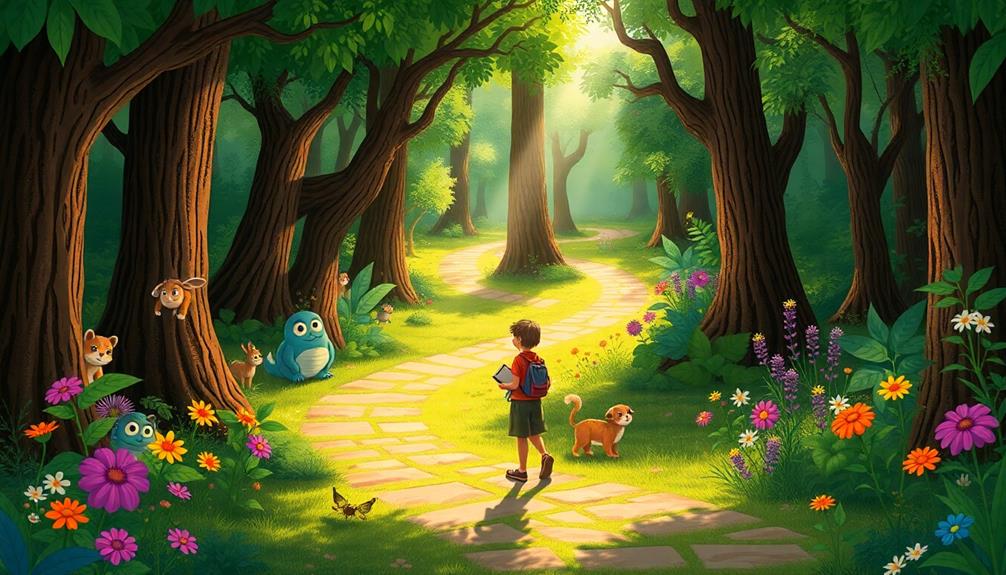Embracing boredom can actually liberate your creativity because it encourages your mind to wander, make new connections, and incubate fresh ideas. Instead of filling every quiet moment with distractions, allow yourself to pause and reflect. Research shows that boredom stimulates neural pathways linked to innovative thinking and emotional regulation, helping you gain insight and clarity. If you stay open to these moments, you’ll discover how boredom can become a powerful source of mental growth and new inspiration.
Key Takeaways
- Boredom stimulates mind wandering, fostering new connections that can lead to creative insights.
- Reflective moments during boredom strengthen neural pathways involved in innovative thinking.
- Embracing boredom allows for mental incubation, enhancing problem-solving and idea generation.
- Boredom provides an emotional pause, promoting emotional regulation and mental clarity.
- Research shows that allowing boredom to occur naturally can boost originality and creative breakthroughs.

Boredom often gets a bad reputation, but it can actually be a powerful catalyst for creativity. When you’re feeling bored, your mind naturally starts to wander, drifting away from the immediate task or environment. This mind wandering isn’t a sign of laziness; it’s your brain’s way of exploring new ideas, making connections, and fueling your creative potential. Instead of fighting boredom, try to embrace it. Let your thoughts drift freely, and you might be surprised at the innovative insights that emerge. This process isn’t just about passing time—it’s an essential part of your emotional regulation. When you’re bored, your brain seeks stimulation, and this internal drive can help you process emotions more effectively. Boredom provides a pause, a moment to step back from constant stimuli, giving you a chance to reflect, reset, and gain perspective on your feelings. This emotional regulation is indispensable because it allows you to manage stress and prevent overwhelm, making space for creative thinking to flourish.
As you allow yourself to be bored, you access a natural state of openness that’s essential for creativity. Instead of seeking immediate distractions, you create a mental environment where new ideas can surface. Your mind begins to make novel associations, combining seemingly unrelated concepts in ways that spark originality. This is why many creative breakthroughs happen during moments of boredom—your brain is free to explore without the constraints of routine thinking. It’s also during these times that your emotional regulation improves because you’re giving yourself the space to process feelings that might otherwise be suppressed or ignored. Neural pathways involved in creative thinking are strengthened during these reflective moments, enhancing your capacity for innovation. Recognizing the connection between boredom and emotional regulation can help you appreciate its role in mental well-being and creative growth. Research suggests that mental incubation during boredom enhances your ability to generate original ideas and solutions. Additionally, understanding the role of spiritual energy in mental clarity can deepen your insight into how internal states influence creative processes.
The key is to resist the urge to fill every lull with digital distractions or quick fixes. Instead, recognize boredom as an opportunity—an invitation to let your mind wander and your emotions settle. When you do this, you engage in a form of mental incubation, where ideas incubate and grow quietly beneath the surface. Over time, this process strengthens your capacity for innovative thinking and emotional resilience. So, next time you feel boredom creeping in, don’t rush to escape it. Instead, see it as a chance to cultivate your creative mind and develop better emotional regulation—transforming a seemingly dull moment into a powerful step toward your creative potential.
Frequently Asked Questions
How Does Boredom Influence Long-Term Creative Development?
Boredom influences your long-term creative development by encouraging your mind wandering benefits, which open up new ideas and perspectives. When you’re bored, you naturally seek ways to entertain yourself, strengthening emotional regulation skills as you manage discomfort. This process boosts your ability to think creatively over time, as your brain learns to find inspiration in unstructured moments. Embracing boredom can, as a result, be a powerful tool for nurturing sustained creativity.
Are Certain Personality Types More Prone to Boredom-Induced Creativity?
Some personality traits make you more prone to boredom susceptibility, which can boost your creativity. If you’re curious, open-minded, or enjoy novel experiences, you’re likely to find boredom prompts you to explore new ideas and solutions. Conversely, those with high conscientiousness might seek structure to avoid boredom. Recognizing your personality traits helps you harness boredom as a catalyst for creative growth, turning dull moments into opportunities for innovation.
Can Boredom Help Solve Complex Real-World Problems?
Boredom can actually boost your ability to solve complex real-world problems by sparking innovation. When you’re bored, your mind shifts into creative thinking mode, allowing you to explore new ideas and perspectives. This state encourages you to break free from routine, leading to innovative solutions. So, next time you’re bored, embrace it—your mind might just find the breakthrough you need through the power of boredom and innovation.
What Are the Psychological Mechanisms Behind Boredom Sparking Ideas?
When you’re bored, your mind naturally wanders, creating a space for new ideas to emerge. This mind wandering activates the default mode network, helping you make unexpected connections. Additionally, boredom triggers dopamine release, which boosts motivation and enhances your ability to think creatively. So, by embracing boredom, you’re allowing your brain to explore different possibilities, sparking innovative thoughts and solutions that might not surface during focused, routine tasks.
How Can Individuals Intentionally Induce Boredom for Creative Benefits?
Imagine you’re living in a time before screens, like the Renaissance. To intentionally induce boredom for creativity, set aside regular downtime without distractions. Practice mindfulness and focus on your breath or surroundings, allowing your mind to wander freely. Schedule intentional downtime daily, disconnect from devices, and embrace moments of stillness. This opens space for your ideas to develop naturally, fueling your creative spark through mindful, boredom-induced reflection.
Conclusion
So, next time you find yourself bored, remember it might just be the moment your creativity sparks unexpectedly. Coincidentally, some of the greatest ideas often come when you least expect them—during those dull moments when your mind drifts. Embrace boredom instead of fighting it; you never know, this simple shift could lead to your next big breakthrough. Sometimes, the key to innovation is simply allowing yourself to sit quietly and let inspiration surprise you.









